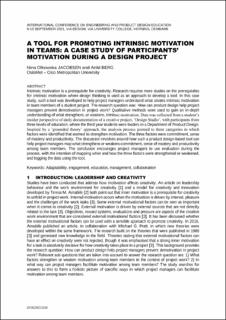A Tool for Promoting Intrinsic Motivation in Teams: A Case Study of Participants’ Motivation During a Design Project
Conference object
Published version
Permanent lenke
https://hdl.handle.net/11250/2986156Utgivelsesdato
2021Metadata
Vis full innførselSamlinger
Originalversjon
https://doi.org/10.35199/EPDE.2021.69Sammendrag
Intrinsic motivation is a prerequisite for creativity. Research require more studies about the prerequisites for intrinsic motivation where design thinking has been used as an approach to develop a tool. In this case study such a tool is developed to help project managers understand what creates intrinsic motivation in team members of a student project. The research question was: how can product design help project managers prevent demotivation in project work? Qualitative methods have been used to gain an in-depth understanding of what strengthens, and weakens, the intrinsic motivation. Sources has been data collection from a students insiders perspective with daily documentation of a creative project, ‘Design Studio’, with participants from three levels of education, where the third year students were leaders at a Department of Product Design. Inspired from ‘grounded theory’ approach, the analysis process pointed to three categories, in which factors were identified that seemed to strengthen motivation. The three factors were commitment, feeling of mastery and productivity. The discussion evolves around how such a product design-based tool can help project managers to map what strengthens and weakens, commitment, feeling of mastery and productivity among team members. The conclusion encourages project managers to use evaluation during the process, with the intention of mapping when and how the three factors were strengthened, or weakened, and logging the data using the tool. Keywords: Adaptability, engagement, education, management, collaboration

